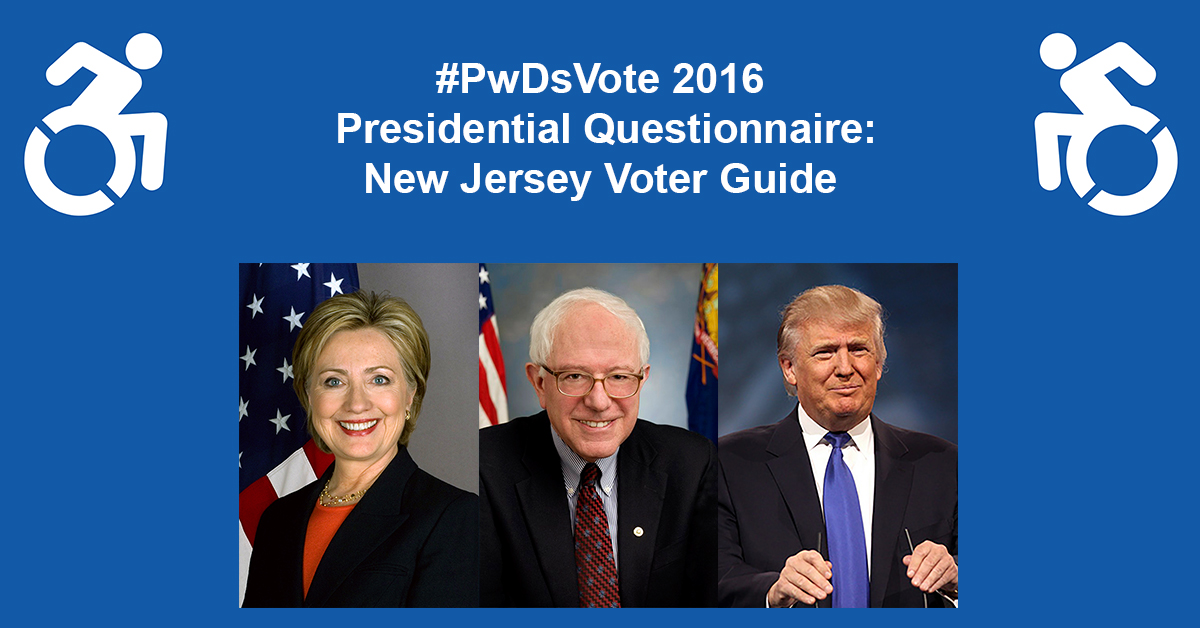
Washington, May 25 – As voters head to the polls in New Jersey next month, RespectAbility is releasing its New Jersey Disability Voter Guide.
There are 935,833 people with a disability living in New Jersey, 409,000 of whom are of working age (between the ages of 21 and 64). There are an additional 20,300 people ages 16-20 with disabilities, many of whom are hoping to enter the workforce. New Jersey’s voters are looking to know where the candidates stand on important disability issues in order to increase opportunities for competitive, integrated employment for people with disabilities.
The #PwDsVote 2016 Campaign Questionnaire was designed for people with disabilities (PwDs) and those who love them to know where candidates stand on the issues. The questionnaire asked all of the presidential candidates on both sides of the aisle to comment on 16 disability questions. Former Sec. of State Hillary Clinton and Sen. Bernie Sanders responded by addressing all of the questions. They each have significantly different views on the issues.
Despite numerous requests in person and by phone and email, presumptive Republican nominee Donald Trump has not yet filled out the questionnaire. However, several Republican candidates who have since dropped out of the race did respond to the questionnaire including former Gov. Jeb Bush, who addressed all of the questions, and Dr. Ben Carson, Gov. Chris Christie and Gov. John Kasich, all of whom filled out parts of the questionnaire.
RespectAbility is nonpartisan and does not endorse candidates. The questionnaire is purely for educational purposes as voters go to the polls.
Fully one-out-of-five voters have a disability, and 52 percent of likely voters have a loved one with a disability. Only 34 percent of working-age Americans with disabilities have jobs, despite the fact that the vast majority want to work. More than 11 million working age people with disabilities are now living on government benefits in our country.
RespectAbility President Jennifer Laszlo Mizrahi said, “Our community is looking for jobs so we can achieve the American dream, just like anyone else. It is vital for us to know where the candidates stand economic, stigma, education, safety, transportation, housing, healthcare, foreign affairs and other issues. The candidates have hugely different ideas about how to deal with the issues. Thus, it’s extremely important to read their full answers so you can understand their vast differences.”
New Jersey has the seventeenth highest percentage of employed people with disabilities (39.2 percent), compared with 76.5 percent of people without disabilities. View the rankings of all 50 states and compare.
RespectAbility expects outcomes to improve for people with disabilities in New Jersey in the future. RespectAbility has submitted comments for all 50 state’s drafts of the Unified Plan as required under Section 102 of The Workforce Innovation and Opportunity Act (WIOA). New Jersey’s WIOA plan addresses a number of issues concerning people with disabilities and employment. Section 503 of the Rehabilitation Act of 1973 was specifically identified among the goals to further align Vocational Rehabilitation with one-stop career centers. A commitment also was made to take advantage of the new 503 regulations and the seven percent rule – government employers must now attain, or show progress toward attaining, a workforce that consists of at least seven percent of people with disabilities.
New Jersey’s plan also addresses the unique workforce challenges facing ex-offenders as they attempt to reenter society, and was one of the very few states who mentioned this issue in its state plan altogether. The plan provides a summary of the activities being carried out under the Reintegration of Ex‐Offenders Program and specifically outlines the workforce development efforts being done to support returning citizens. This is an issue in all states, as those with disabilities and a criminal record have a much more difficult time reaching employment than someone with only one of those characteristics.
New Jersey recently has become an Employment First state, which can increase and create more positive outcomes for people with disabilities. An example of this is the strong commitment to expand career pathways for individuals with disabilities and to ensure that an increasing number of individuals with disabilities obtain a postsecondary industry‐valued credential or degree.
However, despite this encouraging news, the gap in the labor force participation between people with and without disabilities is nearly 37.3 percent. While this is lower than 39 other states, this lack of employment for people with disabilities creates poverty, powerlessness and poor health. Polls and studies show that people with disabilities want the opportunity to have the dignity and independence that jobs provide.
America has 1.2 million youth with disabilities, between the ages of 16 and 20. Each year 300,000 of them age into what should be the workforce, but stigmas and lack of knowledge about the capabilities of people with disabilities means that most do not find employers willing to hire them. Young adults with disabilities in all of these states are hoping to find work. They have high expectations and deserve the opportunity to achieve the American dream. Young people with disabilities may simply need some thoughtful help to transition into the workforce.See data on all 50 states here: State Data.
RespectAbility will continue to urge Trump to submit his ideas for the disability community. When he does so, we will update the guide. The questionnaire is being distributed to more than 50,000 people who care about disability issues, more than ten thousand of whom live in the early primary states and the heads of more than 100 national disability organizations, many of whom will share with their own lists. RespectAbility also has placed online ads sharing the questionnaire.






Be First to Comment